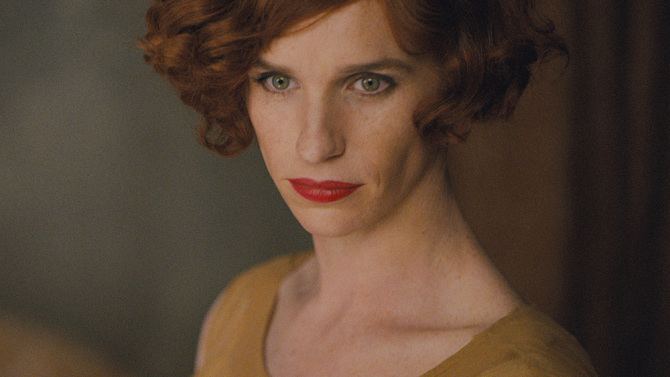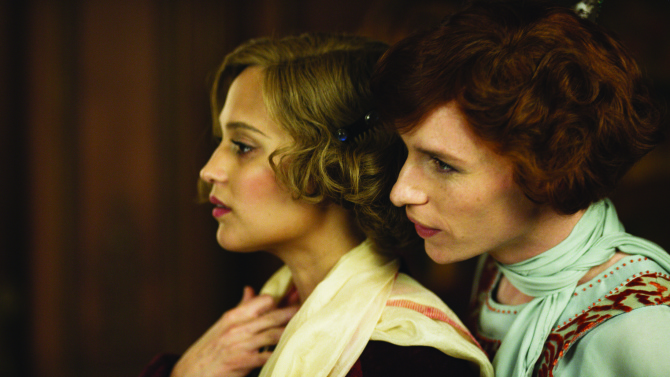The Danish Girl (2015)
CAST: Eddie Redmayne, Alicia Vikander, Matthias Schoenaerts, Amber Heard, Ben Whishaw, Sebastian Koch
REVIEW:
The Danish Girl arrives in theaters at a time when it’s virtually guaranteed to be rewarded with Academy Awards attention. Transgender issues are prominent in the news, and it’s easy to be cynical about feeling there’s something a little opportunistic in the timing and subject matter of director Tom Hooper and star Eddie Redmayne clearly aiming for what would be each man’s second Oscar, but more visible representation for the transgendered community in high-profile Oscar contender motion pictures isn’t a bad thing. Based on the same-named 2000 novel by David Ebershoff, itself a somewhat fictionalized account of the true story of transgender pioneer Einar Wegener/Lili Elbe, The Danish Girl, like Hooper’s Oscar-winning The King’s Speech, is a somber, stately, and sedate period film, and while its subdued tone sometimes mutes its emotional impact, it’s still a poignant and handsomely-filmed semi-biographical drama.
In 1926 Copenhagen, Danish painter couple, popular landscape artist Einar Wegener (Eddie Redmayne) and portrait artist Gerda Gottlieb (Alicia Vikander) seem a happily-married young couple, although Einar’s artistic career is more successful than his wife’s. One day, Gerda convinces Einar to stand in for a no-show female model by posing in female clothing, and the new model in Gerda’s portraits—which she passes off as Einar’s visiting female cousin—attracts new levels of attention to her art. Complications arise, however, as Einar turns out to enjoy this more than either of them had anticipated. The couple treats Einar’s newfound, seemingly casual interest in crossdressing as first a harmless joke, then a bit of kinky roleplaying, but the experience unlocks a female split personality Einar has repressed since childhood, called “Lili”, and things quickly spiral out of control. Einar becomes a recluse and wears his wife’s clothing around the house, loses enjoyment in he and Gerda’s previously active sex life, engages in a tentative semi-romance with another man (Ben Whishaw), and increasingly disappears entirely into his Lili persona. Einar/Lili undergoes radiation therapy in a desperate—and futile—attempt to “fix” himself, but as time goes on, both Einar/Lili and Gerda come to believe Einar/Lili is a woman trapped in a man’s body. Gerda seeks out an art dealer named Hans (Matthias Schoenaerts), a childhood friend of Einar’s, for support, but the mutual attraction between Gerda and Hans adds another wrinkle to she and Einar’s increasingly complicated relationship. Eventually, after no other doctor offers a constructive solution, they come across an unorthodox German doctor, Warnekros (Sebastian Koch), at whose hands Einar/Lili will undergo a radical operation that has never been attempted before: a sex reassignment surgery to physically transform a man into a woman.
As one might expect from Tom Hooper based on The King’s Speech and his 2012 musical adaptation of Les Miserables, The Danish Girl is a very pretty motion picture. When it comes to scenic landscape shots, it is perhaps only surpassed this year by The Revenant. Dramatically, it’s more inert. The stately, sedate tone keeps the emotions subdued and restrained, perhaps too much so. It’s unfair to say Hooper beats around the bush—both Redmayne and Vikander display full frontal nudity—but there’s a sense that he holds everything to tasteful, mainstream, uncontroversial levels. The movie does touch on the difficulties faced by transgendered individuals in the 1920s when their situation received little understanding or sympathy, as Einar/Lili is sexually harassed and beaten by two men in a park, and various doctors he turns to for help propose everything from a lobotomy to institutionalization in a straitjacket, but the movie’s self-consciously arthouse vibe cools the powerful and complex emotions churning under the surface.
 To the extent that the movie transcends its own self-imposed limitations, it’s usually due to the actors. Eddie Redmayne (reuniting with Hooper from Les Mis) and Alicia Vikander hold nothing back, either physically (both show just about all they have to show) or emotionally. Redmayne, whose embodiment of Stephen Hawking in The Theory of Everything won him an Oscar, portrays the beginning to end journey of a man transitioning into a woman, although the argument could again be made that it’s a technically physically accomplished performance but shallower in emotional depth. With his slender figure and delicate features, Redmayne is passably feminine when he dons Lili’s wigs, dresses, and makeup, and captures some little authentic touches, such as when Einar studies women to mimic their mannerisms and hand gestures. Redmayne’s expressions and body language convey the gradual evolution of a man initially shy and awkward in women’s clothing, to the growing confidence as Lili eclipses Einar.
To the extent that the movie transcends its own self-imposed limitations, it’s usually due to the actors. Eddie Redmayne (reuniting with Hooper from Les Mis) and Alicia Vikander hold nothing back, either physically (both show just about all they have to show) or emotionally. Redmayne, whose embodiment of Stephen Hawking in The Theory of Everything won him an Oscar, portrays the beginning to end journey of a man transitioning into a woman, although the argument could again be made that it’s a technically physically accomplished performance but shallower in emotional depth. With his slender figure and delicate features, Redmayne is passably feminine when he dons Lili’s wigs, dresses, and makeup, and captures some little authentic touches, such as when Einar studies women to mimic their mannerisms and hand gestures. Redmayne’s expressions and body language convey the gradual evolution of a man initially shy and awkward in women’s clothing, to the growing confidence as Lili eclipses Einar.
 But as good as Redmayne is, the real star of The Danish Girl is Alicia Vikander, whose Gerda is in many ways the real central character of the film. The movie does a better job developing Gerda than Einar/Lili. Perhaps this is partly because Gerda is easier for many viewers to relate to, but Gerda has the better-delineated emotional character arc, beginning as a vibrant, sexy, broad-minded and self-assured woman, unabashed about displaying her sexuality, who initially treats her husband’s crossdressing as a game that both gives her an intriguing new art subject and spices up their love life, then is shocked and devastated when she realizes the floodgates she has inadvertently helped open. Gerda runs the gamut of emotions as Einar/Lili’s transition progresses: confusion, shock, devastation, then gradually coming to believe in and accept Einar/Lili’s conviction that he is a woman trapped in a man’s body, and ultimately realizing that helping her husband find self-fulfillment may entail letting him go. While cases could be made for both leads to receive Oscar nominations (and, given the timely subject matter and the transformative nature of his performance, a nod for Redmayne seems inevitable), Vikander’s performance is the more heartfelt and shows fuller emotional range. Belgian actor Matthias Schoenaerts, German actor Sebastian Koch, Amber Heard (as a saucy socialite friend of the Wegener couple), and Ben Whishaw (also recently in theaters in both Spectre and In the Heart of the Sea) are adequate in smaller supporting roles, but the movie belongs to Redmayne and especially Vikander.
But as good as Redmayne is, the real star of The Danish Girl is Alicia Vikander, whose Gerda is in many ways the real central character of the film. The movie does a better job developing Gerda than Einar/Lili. Perhaps this is partly because Gerda is easier for many viewers to relate to, but Gerda has the better-delineated emotional character arc, beginning as a vibrant, sexy, broad-minded and self-assured woman, unabashed about displaying her sexuality, who initially treats her husband’s crossdressing as a game that both gives her an intriguing new art subject and spices up their love life, then is shocked and devastated when she realizes the floodgates she has inadvertently helped open. Gerda runs the gamut of emotions as Einar/Lili’s transition progresses: confusion, shock, devastation, then gradually coming to believe in and accept Einar/Lili’s conviction that he is a woman trapped in a man’s body, and ultimately realizing that helping her husband find self-fulfillment may entail letting him go. While cases could be made for both leads to receive Oscar nominations (and, given the timely subject matter and the transformative nature of his performance, a nod for Redmayne seems inevitable), Vikander’s performance is the more heartfelt and shows fuller emotional range. Belgian actor Matthias Schoenaerts, German actor Sebastian Koch, Amber Heard (as a saucy socialite friend of the Wegener couple), and Ben Whishaw (also recently in theaters in both Spectre and In the Heart of the Sea) are adequate in smaller supporting roles, but the movie belongs to Redmayne and especially Vikander.
The conclusion of The Danish Girl is poignant and moving, but of the two main characters, only Gerda is a fully fleshed-out character. Try as it might to portray Einar/Lili’s arc ( and we do get some sense of the pain, confusion, and desperate yearning he experiences), he remains at somewhat of a detached distance. Perhaps it’s just easier to relate Gerda’s perspective, or perhaps the filmmakers self-consciously present Einar/Lili as too much a representation of a community rather than a fully three-dimensional human being. In any case, The Danish Girl is a stately, respectable film, but one has the mildly underwhelming sense that it’s merely poignant when it should be more powerful and more devastating.
* * 1/2
